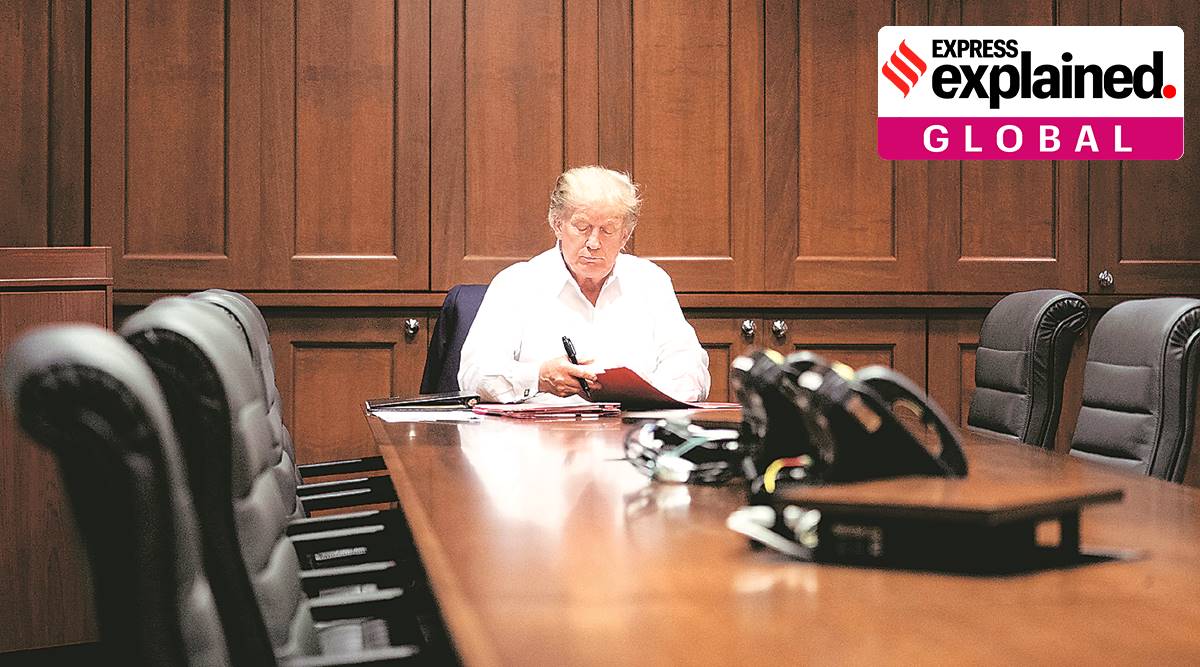If President Donald Trump does end up withdrawing from the race, his running mate, current Vice President Mike Pence, seems to be the most likely replacement.
SINCE US President Donald Trump announced that he and Melania Trump have tested positive for Covid-19, it has led to uncertainty about how the presidential election of November 3 will now play out.
Trump is being treated at Walter Reed Military Hospital in Maryland. While his physician Sean Conley has maintained that the President is doing well and is fever-free, White House Chief of Staff has said Trump’s vital signs have been “very concerning”.
So, what happens if the illness forces Trump out of the race?
No rules about a presidential candidate’s replacement are mentioned in the US Constitution. This is decided by the candidate’s party itself. Therefore, if Trump has to withdraw, it will be up to the Republican party to decide who replaces him.
The Republican Party’s rules empower the Republican National Committee, which comprises 168 members who are senior officials from each state, to decide who will be the presidential candidate if Trump has to withdraw. There are two ways the RNC can choose a replacement: by a simple majority vote, or by reconvening the party convention — which looks unlikely now with the election less than a month away. These rules are applicable in case of a presidential or a vice presidential candidate’s withdrawal or death.
If Trump does end up withdrawing from the race, his running mate, current Vice President Mike Pence, seems to be the most likely replacement.
If there is a new candidate, how will the voting process work?
This is where things get complicated since over 2 million votes have already been cast and millions of ballots have been printed and mailed out with Trump’s name on them. It is unlikely that ballots will be reprinted at so late a stage. Therefore, even if Trump withdraws, it is possible that the ballots will continue to give voters the same choice — between Trump and Joe Biden.
Again, Trump’s possible withdrawal may cause a change of mind in some voters. An article in The Atlantic says that if people who have already voted want to change their mind, in some states they would be allowed to “spoil their ballot” and cast a new one.
Can the election itself be delayed?
Delaying the elections is one way by which the logistics of a candidate replacement could be sorted out. But that is not easy and requires the support of legislation. Congress decides the date of the election and as per law, presidential elections are held on the first Tuesday after the first Monday in November every four years.
Even then, the Constitution has set a hard deadline and the President’s term must end by January 20 — which is when the winner is officially sworn in — of the year following a general election. If a President is not chosen by this date, the Speaker will be required to take over.
Have elections ever been postponed?
According to a 2004 CRS report, over more than 150 years, there have been a few instances where elections have been postponed, such as the 2001 New York state primary because of 9/11, and the 1992 Florida primary because of Hurricane Andrew.
And what if Trump continues, but is incapacitated due to the illness?
There is a constitutional provision under Section 3 of the 25th Amendment that can be invoked if Trump’s symptoms worsen or he needs oxygen support, making it difficult for him to work. The amendment was proposed by Congress in the aftermath of the assassination of President John F Kennedy and provides the procedures for replacing the President or Vice President in the event of death, removal, resignation, or incapacitation.
For this provision to be used, Trump will need to sign a declaration stating his inability to discharge the powers and duties of his office and unless he mentions otherwise, his position is taken over by the Vice President until he recovers.
If the President is so sick as to be unable to invoke this provision, then under Section 4 of the Amendment, the Vice President and a majority of the Cabinet can send a notice to the House and the Senate on the President’s behalf. In this case too, the Vice President will take over his position.
In the unlikely scenario that the Vice President is also incapacitated or dies, as per the Presidential Succession Act of 1947, the Speaker of the House will be required to take over.
The 25th Amendment was invoked by President Ronald Reagan in 1985 and twice by President George W Bush, in 2002 and 2007.
Are there any other scenarios?
A couple of other scenarios can play out. One, if a presidential candidate dies after Election Day but before the Electoral College votes on December 14, then the party will have to coordinate with its electors so that they vote for the replacement. While most electors typically vote for the candidate who has won the popular vote in a state, some states allow the electors to vote for anyone they choose.
The other scenario can play out after the Electoral College votes. The votes are counted by the Congress and need to be certified. So if the winning candidate were to die after December 14 but before the swearing-in, then as per the 20th Amendment, the elected Vice President can take over as President.
? The Indian Express is now on Telegram. Click here to join our channel (@indianexpress) and stay updated with the latest headlines
For all the latest Explained News, download Indian Express App.
Source: Read Full Article


